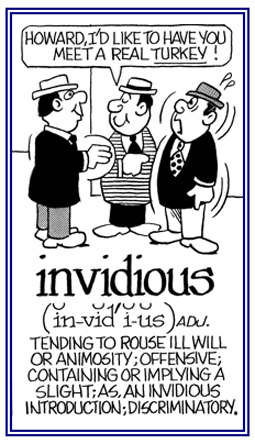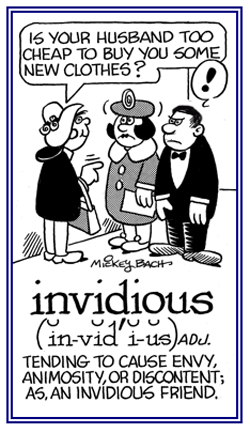vid-, video-, vis-, -vision, -visional, -visionally, visuo-, vu-
(Latin: videre, "to see"; plus words with other related meanings: to notice, noticing, noticed; observe, observing, observed; look, looking, looked; perceive, perceiving, perceived, perception; see, seeing, saw, seen, sight; view, viewing, viewed; manifest, manifesting, manifested; reveal, revealing, revealed, revelelation)
Although many of the words in this unit seem to be from other Latin origins, all of them are etymologically derived from the main Latin videre, "to see" element.
invidious (adjective), more invidious, most invidious
1. Pertaining to something that makes, or implies, an unfair distinction; conveying insulting feelings: In the art class, comparing Jane's work to Mark's resulted in invidious feelings between them.
2. Unpleasant because producing, or likely to produce, jealousy, resentment, or hatred in other people: Henry made invidious remarks about Sam's efforts to reform the system of payments for the company's project because he was quite envious of Sam and said that the reform was not feasible and it was a waste of time and effort.
3. Etymology: from Latin invidiosus, "envious"; from invidia, "ill will"; which came from in-, "upon" + videre, "to see".

© ALL rights are reserved.

© ALL rights are reserved.

© ALL rights are reserved.
Go to this Word A Day Revisited Index
2. Unpleasant because producing, or likely to produce, jealousy, resentment, or hatred in other people: Henry made invidious remarks about Sam's efforts to reform the system of payments for the company's project because he was quite envious of Sam and said that the reform was not feasible and it was a waste of time and effort.
3. Etymology: from Latin invidiosus, "envious"; from invidia, "ill will"; which came from in-, "upon" + videre, "to see".



Go to this Word A Day Revisited Index
so you can see more of Mickey Bach's cartoons.
invidiously
A reference to being unpleasant and likely to cause bad feelings in other people: "They invidiously compared our house with their mansion."
invidiousness
Malevolent provocation of dislike or resentment; the state or quality of being invidious: "The invidiousness which was displayed by our boss was a demoralizing blow to our working conditions."
invisibility
1. That which is incapable by nature of being seen or inaccessible to view; hidden.
2. Imperceptible, inconspicuous; not appearing in published financial statements or not reflected in statistics.
2. Imperceptible, inconspicuous; not appearing in published financial statements or not reflected in statistics.
invisible
1. Impossible to see; not visible; for example, air and sound waves are invisible.
2. Not accessible to view; hidden: "The mountains have become invisible because of the clouds."
3. Not easily noticed or detected; inconspicuous.
4. Not published in financial statements; such as, an invisible asset.
2. Not accessible to view; hidden: "The mountains have become invisible because of the clouds."
3. Not easily noticed or detected; inconspicuous.
4. Not published in financial statements; such as, an invisible asset.
invisibleness
A condition where something, or someone, is imperceptible to the eyes or incapable of being seen.
invisibly
1. Without being seen.
2. Concealed from sight; hidden.
2. Concealed from sight; hidden.
1. The philosophy or science of law, the legal system, and the principles that lead courts to make the decisions that they do: Some forms of jurisprudence include specific departments or divisions of law.
2. A particular system or body of laws imposed by authorities.
3. Etymology: "knowledge of law" from Latin jurisprudentia, "the science of law"; from juris, "of right, of law" + prudentia, "knowledge, a foreseeing, foresight, sagacity, wisdom" as applied in this term.
2. A particular system or body of laws imposed by authorities.
3. Etymology: "knowledge of law" from Latin jurisprudentia, "the science of law"; from juris, "of right, of law" + prudentia, "knowledge, a foreseeing, foresight, sagacity, wisdom" as applied in this term.
A standard measure of the responses of the eyes to monochromatic (one color) light at various wavelengths: As part of her research, the ophthalmologist, Dr. Robinson, studied the changes in the luminosity functions of the eyes of her patients.
marginal vision
A borderline ability to perform a visual function or barely able to see.
monocular vision
Having sight with only a single eye or being able to see with just one eye.
multiple vision, polyopia
1. A condition in which more than one image of an object is formed, or seen, on the retina.
2. A visual perception of several images of a single object.
3. Having multiple vision; the seeing of one object as more than one.
2. A visual perception of several images of a single object.
3. Having multiple vision; the seeing of one object as more than one.
Nemo in amore videt.
No one in love can see.
From Propertius: Love is blind.
night vision, scotopic vision
1. The ability to see in reduced illumination; as in moonlight.
2. Seeing in dim light or a type of vision that occurs at very low levels of illumination, and it can detect differences of brightness but not of hue.
3. The ability to see in the dark.
2. Seeing in dim light or a type of vision that occurs at very low levels of illumination, and it can detect differences of brightness but not of hue.
3. The ability to see in the dark.
Non semper ea sunt quae videntur.
Things are not always what they appear to be.


